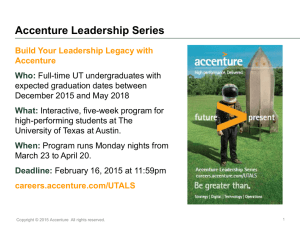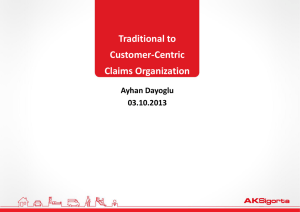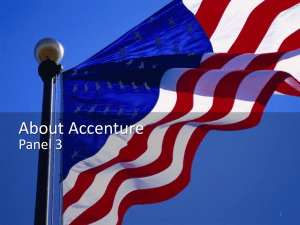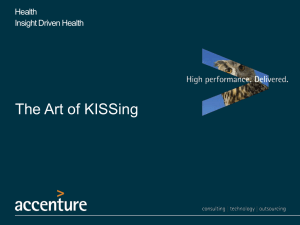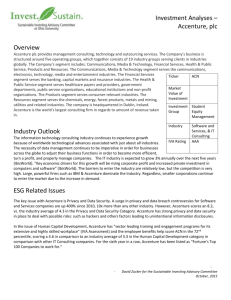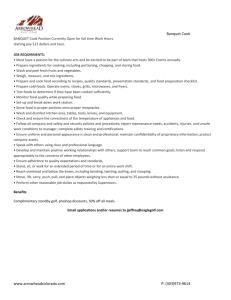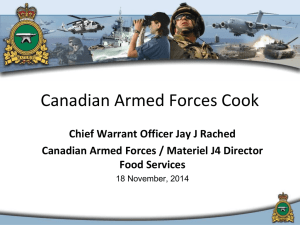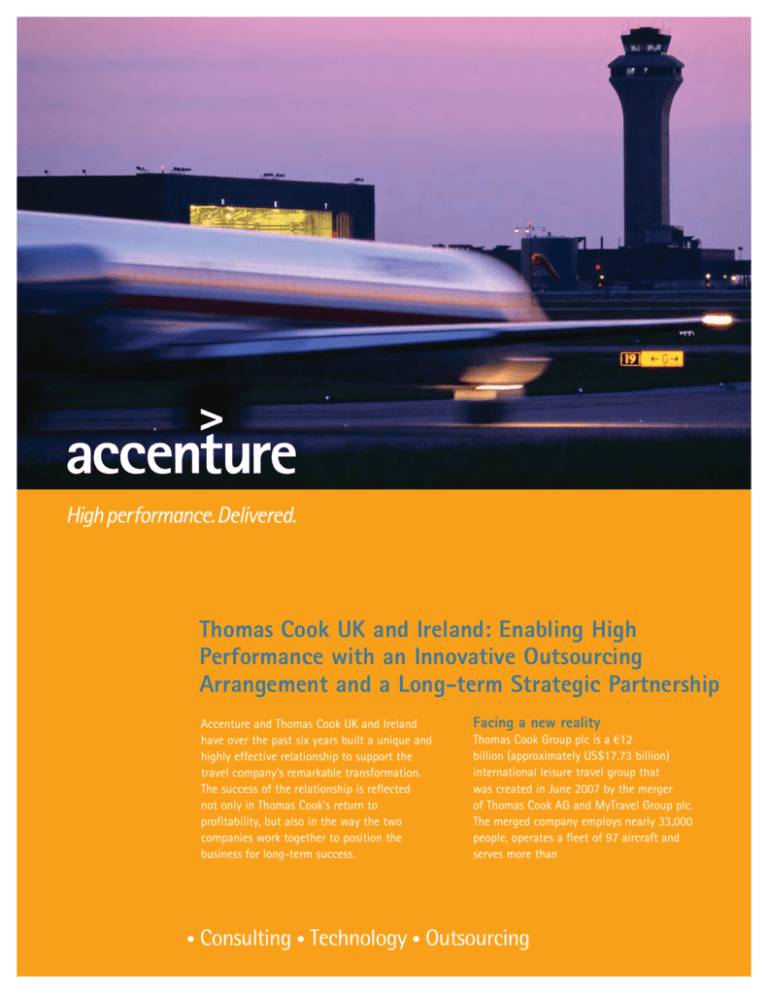
Thomas Cook UK and Ireland: Enabling High
Performance with an Innovative Outsourcing
Arrangement and a Long-term Strategic Partnership
Accenture and Thomas Cook UK and Ireland
have over the past six years built a unique and
highly effective relationship to support the
travel company’s remarkable transformation.
The success of the relationship is reflected
not only in Thomas Cook’s return to
profitability, but also in the way the two
companies work together to position the
business for long-term success.
Facing a new reality
Thomas Cook Group plc is a €12
billion (approximately US$17.73 billion)
international leisure travel group that
was created in June 2007 by the merger
of Thomas Cook AG and MyTravel Group plc.
The merged company employs nearly 33,000
people, operates a fleet of 97 aircraft and
serves more than
“In our relationship with Accenture,
we’re not just outsourcing tasks.
We are delegating responsibility.
Doing so allows us to spend much
more time focusing on what we
want the business to be—namely
a high-performance business that
consistently beats its competitors.”
Juergen Bueser, Thomas Cook Group chief
financial officer
Thomas Cook UK and Ireland is a
key division of the parent company.
It serves 6.3 million passengers and
employs more than half of Thomas
Cook’s worldwide workforce. Even
before the merger between Thomas
Cook AG and MyTravel, Thomas
Cook UK and Ireland was one of
the United Kingdom’s largest travel
companies. In 2006, the division
reported sales revenues of €2.5 billion
(approximately US$3.69 billion), or
approximately one-third of Thomas
Cook AG’s sales for the year.
The fortunes of Thomas Cook
UK and Ireland have not always
been so bright. Despite its long-held
reputation for service and its highly
recognized brand, the company
operates in an industry known
for its low margins and intense
competition. Finding innovative
ways to save money has, therefore,
always been near the top of the
management agenda. The need
to streamline operations became
particularly pronounced in 2001.
That year, the terrorist attacks of
September 11 wreaked havoc on
the international travel sector and
contributed to a worldwide economic
downturn. Travel companies that had
enjoyed a successful financial run
were now facing considerable losses.
Complicating matters for Thomas
Cook UK and Ireland was the fact
that the division’s three business
units—sales, tour operations and
the airline—were not integrated.
Each business unit had its own
management board and infrastructure,
financial processes and information
technology (IT) systems. Everything
was decentralized. Each business
had, in effect, its own back office.
In a changing industry with discount
airlines and new Internet-based travel
service providers with much lower
cost structures, these back-office
inefficiencies threatened the
company’s very viability.
Launching a total
transformation
In response to these challenges,
Thomas Cook UK and Ireland launched
a bold transformation program aimed
at reducing operating costs, improving
margins and bolstering its competitive
advantage. A major component of the
business transformation plan included
integrating operations and creating a
single center for back-office processes
in the areas of human resources,
finance and accounting, payroll and
IT. Unlike many companies looking to
optimize their back-office operations,
Thomas Cook UK and Ireland was
not interested in simply finding
a lower-cost way of carrying out
the same business processes. It
was looking, instead, for a strategic
relationship with a trusted associate
willing to make investments and
share risks and rewards in the
pursuit of common goals.
That company turned out to be
Accenture. Thomas Cook selected
Accenture for a variety of reasons,
including its breadth of experience
and insights, its ability to lead a
significant change management
effort, its commitment to continuous
improvement and its willingness
to evolve the relationship over time
to meet the changing needs of the
Thomas Cook business. Perhaps most
important was Accenture’s proven
record of delivering high-quality
results quickly. According to Martin
Alley, director of procurement and
shared services at Thomas Cook UK
and Ireland, “We needed confidence
that our alliance would be able to
drive benefits over the term of the
agreement. We had that confidence
in Accenture.”
Enabling a phenomenal
turnaround
The cornerstone of the initial 10-year
arrangement between Accenture and
Thomas Cook UK and Ireland was the
creation of a single service center
designed to manage multiple
processes—IT, finance, human
resources (HR) administration
and payroll—under one roof.
Under terms of the arrangement,
Accenture assumed responsibility
for the management of services
and the overall performance
of the planned service center.
Bundling the provision of backoffice services to Accenture
brought a number of advantages.
For Accenture, it meant that the
Accenture team could assume
greater accountability for the
seamless delivery of services
and better ensure that backoffice functions were aligned
with organizational objectives.
For Thomas Cook, the bundled
arrangement consolidated widely
dispersed IT, finance and HR
functions. It optimized service delivery
costs, simplified communications and
governance processes, and minimized
the number of interactions with
suppliers. And it allowed Thomas
Cook’s executives to focus on
more strategic activities such as
reorganizing the business. As Juergen
Bueser, Thomas Cook Group chief
financial officer, stated, “In our
relationship with Accenture, we’re
not just outsourcing tasks. In reality,
we are delegating responsibility.
Doing so allows us to spend much
more time focusing on what we
want the business to be—namely
a high-performance business that
consistently beats its competitors.”
In building the multi-function model,
Accenture transferred more than 250
Thomas Cook employees to Accenture
and developed a single, integrated
platform based on SAP R/3 (version
4.6c) for the entire business. From
the start, Thomas Cook UK and Ireland
executives knew that SAP was the
right choice, since so many other
Thomas Cook AG country operations
were already successfully using SAP.
With its deep SAP and systems
integration expertise, Accenture
helped design, build and run an
integrated solution that provided
a common financial “language,”
technology base and financial
reporting structure. According to
Carl Dawson, Thomas Cook UK and
Ireland’s chief information officer,
the single SAP platform produced
huge benefits in terms of visibility
and transparency across the
organization. “For the first time,
we were able to monitor and measure
the business and gain a single view
of all transactions processed around
the UK and Ireland group. We had
gained one version of the truth.
We knew whether we were making
or losing money, and we were not
hindered by [a legacy environment
made up of] 13 different financial
systems.” In addition to customizing
the SAP system to optimally support
the HR, IT and finance areas, the
team built industrial-strength
interfaces between the back-office
functions and critical front-office
applications such as tour operations,
sales and reservations. The team
also engaged Accenture’s change
management professionals to build
an SAP-enabled communications
portal, which assisted Thomas
Cook UK and Ireland with channeling
their communications to the entire
organization.
Within 16 months, the co-sourcing
arrangement reduced costs by more
than 30 percent and helped take
nearly US$290 million of overhead
expenses out of the business. The
consistency of Accenture’s service
delivery also allowed Thomas Cook
UK and Ireland to accurately predict
its ongoing back-office expenses and
gain cost certainty for the first time.
When Accenture and Thomas Cook
UK and Ireland entered into the
co-sourcing arrangement, both parties
recognized the need to be flexible to
accommodate any changes in service
that might be required. That flexibility
came into play during the third year
of the co-sourcing deal. At that time,
Thomas Cook UK and Ireland wanted
to build on the success of the existing
arrangement, transition to a fixed-fee
model and create additional value by
tapping the skills and know-how of
resources from the Accenture Global
Delivery Network.
Working closely with Thomas Cook
UK and Ireland, Accenture identified
a number of activities carried out by
the onshore delivery center that could
be migrated to the Accenture Delivery
Center in Bangalore, India. As with
the original co-sourcing agreement,
the goal for this move was based on
more than cost savings. Thomas Cook
UK and Ireland wanted to raise the
quality of its back-office services, as
well as its productivity levels, to new
heights. Maintaining the bundled
provision of service in the offshore
model was critical. As Juergen
Bueser explains, “I personally believe
that there are strong benefits of
outsourcing both the finance side,
as well as the HR side, and—to go
with that—the IT side, to one sole
provider. Some of the benefits
are easily tangible like being able
to optimize costs through those
functions, being able to have one
governance model, and being able
to better manage risk across the
whole organization. But ultimately
I think it also creates value by
leveraging the scale and the scope
of two organizations working
together in a true partnership.”
Under a new 10-year arrangement,
Accenture transitioned approximately
70 percent of the centers workload—
including activities related to
application management, finance
and accounting operations,
payroll help desk and training
administration—to its Accenture
Delivery Center in Bangalore.
The remaining onshore resources
focused on more strategic activities,
including IT operations, reporting and
payroll processing. Under the new
agreement, Accenture was managing
approximately 400 back-office
processes and 300 applications
for Thomas Cook UK and Ireland.
Accenture migrated the majority
of the work in just six months,
and completed the transition in
11 months—meeting all transition
goals on time and on budget. This is
a notable achievement, considering
the migration represented one
of the industry’s first large-scale,
bundled transitions to an offshore
delivery center environment. The
results of the service transition speak
for themselves. Since migrating the
bundled back-office service delivery
to the Accenture Delivery Center in
Bangalore, Thomas Cook UK and
Ireland has been able to reduce its
costs by an additional 30 percent,
giving it one of the lowest cost
models in the industry.
According to Martin Alley, “At
the outset of our relationship with
Accenture, we were losing money.
Now we’ve moved to significant
In 2006 and 2007, the Accenture
and Thomas Cook team received high
honors at awards programs sponsored by
Outsourcing Journal, FAO Research, Inc.
and the UK Management Consultancies
Association.
“Accenture’s involvement is allowing us to focus on
our customers and our core competencies. At the same
time, the strategic sourcing arrangement is providing us
with greater control of our back-office functions. While
many people assume outsourcing means ‘letting go,’
Accenture has implemented tools and processes that
give us a much greater visibility into our operations.
With this visibility, we’ve been able to unleash new
capabilities and insights into the marketplace in a
way we could have never done before.”
Manny Fontenla-Novoa, Thomas Cook Group joint chief executive
profit. The UK and Ireland business
made £87 million (approximately
US$180 million) profit in 2006. We
had a five percent margin, which
is exceptional for our industry.
Outsourcing was clearly a contributor
to this.” Not surprisingly, industry
experts have taken notice of
the strength of the outsourcing
relationship between Accenture and
Thomas Cook UK and Ireland—and
the benefits achieved. In 2006 and
2007, the Accenture and Thomas
Cook team received high honors
at awards programs sponsored by
Outsourcing Journal, FAO Research,
Inc. and the UK Management
Consultancies Association.
Facilitating Thomas Cook’s
continued growth
By 2007, the bundled outsourcing
program had consistently and
repeatedly demonstrated its value in
helping Thomas Cook UK and Ireland
reduce costs, streamline operations
and raise the quality and consistency
of back-office service delivery. When
Thomas Cook merged with MyTravel
in June 2007, the back-office
outsourcing deal once again proved
its worth—this time by contributing
significantly to the integration of the
newly formed Thomas Cook Group plc.
Thomas Cook’s decision to merge with
UK-based MyTravel Group plc was
founded on the belief that the
combined company could create a
more flexible and cost-competitive
travel company with improved travel
services for millions of European
passengers. To take greatest
advantage of the synergies of the
two companies—estimated to be
worth several millions of pounds
per month—Thomas Cook needed
to integrate the two companies’ UK
operations quickly. The integration
focused on the Thomas Cook and
MyTravel operations in the United
Kingdom because that is where both
companies had a similar footprint,
business model and organizational
structure and, according to Juergen
Bueser, “where the greatest
integration challenges resided.”
Thomas Cook UK and Ireland set
an aggressive timeframe to have
the integration completed in just four
months to coincide not only with the
start of Thomas Cook’s fiscal new
year, but also the beginning of the
winter travel season. This was an
ambitious goal, considering that
the merger practically doubled
the organization’s size, customers,
employees, systems and processes
over night. While Thomas Cook
focused on managing the integration
of front-office systems and processes,
the travel giant asked Accenture to
manage the integration of MyTravel’s
back-office functions to Thomas
Cook’s outsourcing operations. The
decision to assign the integration
project (as well as a new 10-year
bundled outsourcing arrangement)
to Accenture was based on
Accenture’s deep understanding
of the service areas being
transitioned, the trust that Thomas
Cook had developed over the years
in Accenture’s capabilities, and
Accenture’s proven commitment
to doing all it could to help Thomas
Cook achieve high performance.
Accenture quickly mobilized a team
dedicated to transitioning knowledge
and service provision to Accenture.
First on the integration agenda was
MyTravel’s IT and finance services
and applications. In record time,
Accenture recruited and trained 230
additional personnel to manage the
expanded scope of back-office
services the merger would bring
about. At the same time, Accenture
applied proprietary methodologies
contained in the Accenture Delivery
Methods and the Accenture Rapid
Transition Suite to upgrade hardware
and convert MyTravel’s finance
applications, which ran on an
Oracle platform, to the Thomas Cook
SAP enterprise system. This effort
involved migrating huge quantities of
MyTravel’s back-office data—ranging
from payroll to travel booking to
financial information—to the SAP
solution. In less than five months,
all back-office finance and IT systems
of the Thomas Cook and MyTravel
organizations were fully integrated.
The integration of the remaining HR
and payroll systems and services are
next in line.
business, financial accounts, suppliers,
customers and employee contracts.
Accenture tapped its change
management expertise to craft a
detailed knowledge transfer approach
and assign team members to carry
out the knowledge transfer activities
with their MyTravel counterparts and
with vendors and customers.
Accenture’s change management
experts also orchestrated the
communications with vendors
and instructed them on new ways
to interact with the company.
Just as important as the transfer of
data and back-office services to the
new operating model was the transfer
of all relevant knowledge of the
MyTravel business. Prior to the
merger, MyTravel had outsourced
its back-office activities to a thirdparty provider that, like Accenture
with Thomas Cook, had grown
quite knowledgeable of its client’s
For Juergen Bueser, the transfer of
knowledge represented one of the
greatest integration challenges.
“Whenever you bring two businesses
together, you run the risk of losing
the knowledge of the people who
decide not to join the new
organization. Accenture helped
us phenomenally by making sure
that the transfer of finance and HR
knowledge worked perfectly. It was
great to see Accenture ensuring that
we didn’t lose the corporate memory
in these vital parts of our business.”
The successful merger marks a new
chapter in Thomas Cook’s history.
Manny Fontenla-Novoa, chief
executive of the Thomas Cook Group
described it this way: “Through the
merger of Thomas Cook and MyTravel,
we have transformed both our
business and the industry in general.
We expect to achieve not less than
€200 million (nearly US$300 million)
merger synergies.” Combining the
back-office functions of Thomas
Cook UK and Ireland and MyTravel is
expected to contribute to this figure
by cutting the cost of administering
those bundled services by 30 to 40
percent. The success of the merger is
already evident. Six months after the
merger, the Thomas Cook Group
broke into the Financial Times Stock
Exchange (FTSE) 100 for the first
time, meaning that the company was
among the 100 companies registered
on the UK stock exchange with the
highest market capitalization.
The speed with which Accenture
completed the integration was
unprecedented in the outsourcing
industry for a project of this scale and
complexity. Carl Dawson noted the
strength of the relationship between
Accenture and Thomas Cook as an
enabler of the integration’s success.
“The relationship with Accenture has
allowed us to complete our merger
with MyTravel in almost unbelievable
time.” Juergen Bueser agrees. “The
speed and pace by which we managed
this transformation is for me still
pretty unbelievable. If I had to do it
all over again, one thing I wouldn’t
change is doing it with Accenture.”
Creating a culture of
high performance
Accenture’s research shows
that high-performance businesses
establish decision-making structures
and workforce cultures that can
accelerate insight into action,
unleash an organization’s energies
and capabilities, and manage the
balance between meeting today’s
needs and tomorrow’s opportunities.
The success of the Accenture and
Thomas Cook outsourcing program
has been due, in large part, to the
careful consideration of just such
objectives, as well as the prudent
delegation of responsibility and the
design of a true business relationship
that benefits both parties.
From the very beginning, Accenture
and Thomas Cook knew that success
was more likely if their arrangement
focused not just on desired outcomes,
but on the way those outcomes
would be realized. To that end,
they established an outsourcing
arrangement built on a new
cultural paradigm marked by
strong governance, partnership,
flexibility, innovation and
continuous improvement.
Governance. The cornerstone
of Thomas Cook UK and Ireland’s
and Accenture’s combined effort
to generate value is a strong joint
governance model that encourages
problem-solving at all levels of both
organizations. Governance has played
a key role in maintaining the
consistency of back-office services
despite changes to the Thomas Cook
business or leadership team, and has
helped to build confidence and trust
in the outsourcing model. Through
regular interactions, Thomas Cook
and Accenture not only review
progress within the contract’s 300
service level agreements, but also
constantly explore opportunities to
strengthen the relationship and drive
greater value from the arrangement.
According to Juergen Bueser, the
governance model is a reflection of
the values that underpin the trusted
relationship between Thomas Cook UK
and Ireland and Accenture. “That our
governance model works so well is a
result of the commitment of all the
people who make the arrangement
work every day.”
Partnership. Accenture and Thomas
Cook UK and Ireland have forged
a trusting and dynamic relationship
that encourages each organization
to do more than they thought possible.
Naturally, the spirit of the partnership
is evident among executives in both
companies. More telling, however,
is the way in which the notion of
partnership has permeated the entire
Thomas Cook and Accenture team.
Those involved in managing the
bundled back-office services are
considered a single and unified
unit. Establishing a “cultural fit”
among employees—which is critical
to maintaining employee loyalty
during times of extraordinary change,
especially when great distances
separate the employees in the United
Kingdom and their counterparts in
India—is now a key metric upon which
Accenture’s performance is measured.
One way that Accenture encourages
such intra-team understanding is
by enabling key employees from the
United Kingdom and India to meet,
share ideas and work collaboratively
to drive service improvements.
This visit program was critical to
successfully transitioning service
delivery to the offshore model.
Flexibility. Flexibility has always been
a critical element of the arrangements
between Thomas Cook UK and Ireland
and Accenture. As Martin Alley has
noted, “Through it’s off shoring
capabilities and its global delivery
network, Accenture provides us the
opportunity to flex up and down quite
readily.” The value of tapping global
expertise and ramping up service
delivery when needed was evident
when Thomas Cook asked Accenture
to transition the majority of its
co-sourced onshore responsibilities
to an offshore outsourcing model
and, more recently, when Accenture
was called upon to manage the
integration at speed of MyTravel’s
back-office services. Accenture’s
flexibility contributed greatly to
the success of both initiatives.
Innovation. The continuous
contribution of ideas and
technologies is important to
finding new opportunities,
staying ahead of the competition
and helping Thomas Cook UK and
Ireland become a high-performance
business. Innovation is so important,
in fact, that a clause in the
outsourcing contract spelled out
the travel company’s desire to have
Accenture introduce innovative
ideas to all aspects of the business.
Accenture has continually applied
innovative solutions—either adopted
from other industries or developed
specifically by Accenture for the
travel sector—to bolster Thomas Cook’s
back-office performance. Examples
of these innovative solutions include
a solution that accelerates invoice
approvals, an invoice management
system that improves data-entry
efficiencies by up to 80 percent, and
an automated HR solution that allows
personnel to manage recruiting and
reporting activities more effectively.
In addition, by applying Accenture’s
Profit Recovery and Analytics
capabilities to analyze Thomas
Cook’s procure-to-pay processes
and data, the team is recovering
significant funds that directly
impact the bottom line.
Continuous Improvement. A keen
focus on continuous improvement is
yet one more factor that distinguishes
the relationship between Accenture
and Thomas Cook UK and Ireland.
In the latest contract, a clause has
been introduced that formalizes
the two companies’ commitment
to operational excellence and to
identifying opportunities to reduce
costs, improve consistency of service,
enhance efficiencies and share
benefits. Team members from
Accenture and Thomas Cook UK
and Ireland meet regularly to discuss
and prioritize these opportunities
and dedicate resources accordingly.
According to Martin Alley, the
shared responsibility for continuous
improvement allows the team to
constantly “review our end-to-end
processes, strip them back down to
their bare essentials, and make sure
that we have a fit-for-purpose
solution that delivers consistent
service and a competitive advantage.”
Each of these factors has played an
important part in building a trusting,
strategic relationship and a culture of
business performance enablement. The
most important element, however, is
the commitment of the people who
bring the promise of the relationship
to life. Martin Alley summed this
up when he said, “I am delighted
“I view Thomas Cook’s relationship with Accenture as a
long-term strategic partnership. We have come a long
way over the past six years. I am looking forward to the
future, and I know that together we will continue to
deliver significant benefits.”
Martin Alley, Thomas Cook UK and Ireland director of procurement
and shared services
and amazed by the relationship with
Accenture. This is really underpinned
by the people who make this
relationship the success that it is.
Both the Thomas Cook and Accenture
personnel work extremely well
together. We share a common
culture, which is evident in our
day-to-day interactions. And we
have a common aim in making
this relationship a success.”
High performance ahead
With Accenture’s help, Thomas
Cook has successfully carried out
a series of business transformations
aimed at streamlining operations,
achieving consistency in back-office
service delivery, reducing costs and
expanding the business to enhance
profitability.
The relationship between the
two companies has evolved and
expanded over time to maintain
Thomas Cook’s momentum in
becoming a high-performance
business. The current arrangement
continues to combine the strengths
of both companies, with Accenture
playing a key role as a strategic
partner enabling the travel company’s
business performance and outcomes.
The benefits of the agreement
extend beyond a new level of
financial improvement and clarity.
In conducting its day-to-day
operations, Thomas Cook UK and
Ireland has greater customer focus,
more flexibility to adjust to business
changes, and improved operational
efficiencies.
According to Manny Fontenla-Novoa,
“Accenture’s involvement is allowing
us to focus on our customers and our
core competencies. At the same time,
the strategic sourcing arrangement is
providing us with greater control of
our back-office functions. While
many people assume outsourcing
means ‘letting go,’ Accenture has
implemented tools and processes that
give us a much greater visibility into
our operations. With this visibility,
we’ve been able to unleash new
capabilities and insights into the
marketplace in a way we could
have never done before.”
Martin Alley agrees. “I view Thomas
Cook’s relationship with Accenture
as a long-term strategic partnership.
We have come a long way over the
past six years. I am looking forward
to the future, and I know that
together we will continue to
deliver significant benefits.”
Copyright © 2008 Accenture
All rights reserved.
Accenture, its logo, and
High Performance Delivered
are trademarks of Accenture.
About Accenture
Accenture is a global management
consulting, technology services
and outsourcing company.
Combining unparalleled experience,
comprehensive capabilities across
all industries and business functions,
and extensive research on the world’s
most successful companies, Accenture
collaborates with clients to help them
become high-performance businesses
and governments. With more than
186,000 people in 49 countries, the
company generated net revenues of
US$23.39 billion for the fiscal year
ended Aug. 31, 2008. Its home page
is www.accenture.com.

